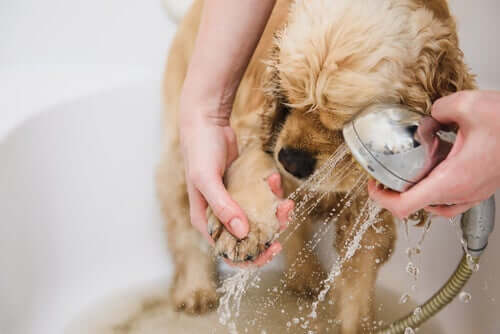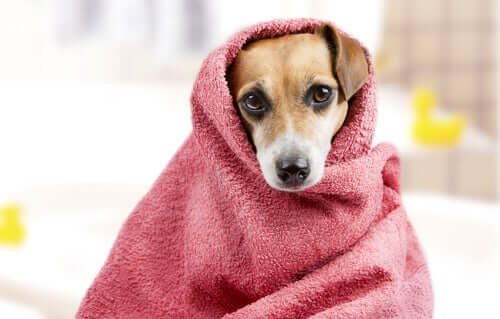Should Owners Bathe Their Pets More Often During Quarantine?


Written and verified by the vet Juan Pedro Vazquez Espeso
Currently, it’s important for us to be more careful than ever about personal hygiene and follow the recommendations of experts. Therefore, there are pet owners who are asking–and rightly so–if they need to bathe their pets more often during quarantine. Is this a necessary part of protecting our households?
On television and the radio, and in newspapers and magazines… By every means possible, health professionals and competent authorities are placing special emphasis on the importance of washing our hands correctly. This insistence isn’t just by chance, as it’s one of the most simple and effective ways to avoid the spread of any illness… not just coronavirus.
With a gesture as simple as washing your hands with soap and water, we eliminate pathogenic particles from our hands and avoid transporting them to our oro-nasal cavities, where they produce infection.
And naturally, many pet owners are extrapolating these recommendations and, therefore, asking themselves if they should bathe their pets more often during lockdown.
Pets and baths
Bathing is a ritual that offers numerous benefits for pets. This is especially true for dogs because they spend part of their lives outdoors. Cats and rabbits, thanks to their hygiene habits and grooming behaviors, don’t, in general, require baths.
Bathing keeps an animal’s fur free of external agents, helps to eliminate impurities, skin waste, and dead hair and cells in general. Of course, bathing animals also helps to eliminate what we consider to be unpleasant odors.

How often should owners bathe their animals during lockdown?
Taking into account the importance of handwashing in regard to COVID-19, what happens when it comes to our pets? In order to answer this question, we need to consider two different scenarios: Uninfected pet owners and those who have tested positive for COVID-19. But, before that, we need to clarify a key point.
Several articles have been published regarding the amount of time that SARS-CoV-2 stays in the air. According to recent studies, it seems that the virus can remain airborne for approximately 3 hours. This means that it’s a particularly heavy virus and that it spends little time “floating” in the environment.
After three hours, the virus particles land on the ground or on surfaces. And now, depending on the type of surface where the virus lands, it can maintain its infectious capacity even longer.
Pet owners that don’t have COVID-19
Andrea lives in her home with her partner and her dog, Lucas. Neither of them shows any signs of being ill from coronavirus. However, they apply the recommendations of the experts and, at the same time, wonder what measures they should take in regard to Lucas.
As we’ve explained already, the virus lasts for a very short time in the air. This means that it’s very unlikely that Lucas, during his walks, would trap the virus particles that are floating in the environment in his fur.
The ground is another matter. There, possible virus particles can remain for a longer period of time. What’s more, Lucas can pick them up with his paws while walking or with his nose while sniffing.
With this in mind, it’s very important to wash your dog’s paws, snout, and tail each after each walk before entering your home.

As for the frequency of baths for pets, scientific evidence suggests that contagion due to aerosols is a factor of scarce importance. Therefore, it doesn’t seem to be necessary for owners to bathe their animals any more often than usual.
Just the same, there are still many unanswered questions when it comes to the behavior of this virus. Therefore, if you walk your dog in a high traffic area or members of your household are at higher risk, then it’s best to bathe your dog more often.
Pet owners that are positive for COVID-19
Daniel lives with his partner and his dog Lola. Daniel’s partner is positive for COVID-19, but he isn’t. In this example, besides the measures of preventative isolation that Daniel and his partner need to practice, they also have to consider Lola’s care.
In this case, despite the lack of evidence suggesting dogs can suffer from or spread coronavirus, Luna could act as a “surface”. Therefore, if Daniel’s partner coughs around Luna, these particles could land on her fur and maintain their infectious capacity.
With this in mind, in order to reduce the risk of infection, Daniel should definitely bathe Lola more often in order to eliminate these possible virus particles. What’s more, he should avoid touching his face after petting Lola (or any other surface that could be contaminated).
How to bathe pets during quarantine?
When the time comes to bathe your pet, simply use your usual shampoo or soap and allow it to act for several minutes. In the meantime, massage the soap into your animal’s fur, paying special attention to its feet. Remember, don’t rub too hard as this may hurt your animal. Rub just enough to make suds as this will keep the area clean.
- Under no circumstances should you use bleach, ammonia or vinegar when you bathe your pets. These products can burn and seriously injure animals.
- Avoid using household cleaning products when bathing animals.
- Nor should you use alcohol in order to bathe your pet or clean its feet. This substance can also cause irritation.
And obviously, after soaping up your pet, it’s extremely important to rinse well in order to eliminate any possible virus particles.

The frequency with which owners bathe their pets will depend on the isolation measures being taken and the level of exposition between the animal and infected individuals. In some cases, animals will require more frequent bathing–perhaps even on a daily basis.
More considerations regarding bathing pets during quarantine?
Of course, not all animals are easy to bathe–such as rabbits. In these cases, you can consider using hygienic towels designed for animals. A concrete case would be a COVID-19 positive pet owner leaving his or her pet to the care of another person during the quarantine period.
In this situation, the temporary carer should bathe the animal as soon as they get home. But apart from that, disinfecting all of the animal’s belongings is also extremely important in preventing possible contagion. Once the animal has had its first bath, the carer and animal can proceed as normal.
Currently, it’s important for us to be more careful than ever about personal hygiene and follow the recommendations of experts. Therefore, there are pet owners who are asking–and rightly so–if they need to bathe their pets more often during quarantine. Is this a necessary part of protecting our households?
On television and the radio, and in newspapers and magazines… By every means possible, health professionals and competent authorities are placing special emphasis on the importance of washing our hands correctly. This insistence isn’t just by chance, as it’s one of the most simple and effective ways to avoid the spread of any illness… not just coronavirus.
With a gesture as simple as washing your hands with soap and water, we eliminate pathogenic particles from our hands and avoid transporting them to our oro-nasal cavities, where they produce infection.
And naturally, many pet owners are extrapolating these recommendations and, therefore, asking themselves if they should bathe their pets more often during lockdown.
Pets and baths
Bathing is a ritual that offers numerous benefits for pets. This is especially true for dogs because they spend part of their lives outdoors. Cats and rabbits, thanks to their hygiene habits and grooming behaviors, don’t, in general, require baths.
Bathing keeps an animal’s fur free of external agents, helps to eliminate impurities, skin waste, and dead hair and cells in general. Of course, bathing animals also helps to eliminate what we consider to be unpleasant odors.

How often should owners bathe their animals during lockdown?
Taking into account the importance of handwashing in regard to COVID-19, what happens when it comes to our pets? In order to answer this question, we need to consider two different scenarios: Uninfected pet owners and those who have tested positive for COVID-19. But, before that, we need to clarify a key point.
Several articles have been published regarding the amount of time that SARS-CoV-2 stays in the air. According to recent studies, it seems that the virus can remain airborne for approximately 3 hours. This means that it’s a particularly heavy virus and that it spends little time “floating” in the environment.
After three hours, the virus particles land on the ground or on surfaces. And now, depending on the type of surface where the virus lands, it can maintain its infectious capacity even longer.
Pet owners that don’t have COVID-19
Andrea lives in her home with her partner and her dog, Lucas. Neither of them shows any signs of being ill from coronavirus. However, they apply the recommendations of the experts and, at the same time, wonder what measures they should take in regard to Lucas.
As we’ve explained already, the virus lasts for a very short time in the air. This means that it’s very unlikely that Lucas, during his walks, would trap the virus particles that are floating in the environment in his fur.
The ground is another matter. There, possible virus particles can remain for a longer period of time. What’s more, Lucas can pick them up with his paws while walking or with his nose while sniffing.
With this in mind, it’s very important to wash your dog’s paws, snout, and tail each after each walk before entering your home.

As for the frequency of baths for pets, scientific evidence suggests that contagion due to aerosols is a factor of scarce importance. Therefore, it doesn’t seem to be necessary for owners to bathe their animals any more often than usual.
Just the same, there are still many unanswered questions when it comes to the behavior of this virus. Therefore, if you walk your dog in a high traffic area or members of your household are at higher risk, then it’s best to bathe your dog more often.
Pet owners that are positive for COVID-19
Daniel lives with his partner and his dog Lola. Daniel’s partner is positive for COVID-19, but he isn’t. In this example, besides the measures of preventative isolation that Daniel and his partner need to practice, they also have to consider Lola’s care.
In this case, despite the lack of evidence suggesting dogs can suffer from or spread coronavirus, Luna could act as a “surface”. Therefore, if Daniel’s partner coughs around Luna, these particles could land on her fur and maintain their infectious capacity.
With this in mind, in order to reduce the risk of infection, Daniel should definitely bathe Lola more often in order to eliminate these possible virus particles. What’s more, he should avoid touching his face after petting Lola (or any other surface that could be contaminated).
How to bathe pets during quarantine?
When the time comes to bathe your pet, simply use your usual shampoo or soap and allow it to act for several minutes. In the meantime, massage the soap into your animal’s fur, paying special attention to its feet. Remember, don’t rub too hard as this may hurt your animal. Rub just enough to make suds as this will keep the area clean.
- Under no circumstances should you use bleach, ammonia or vinegar when you bathe your pets. These products can burn and seriously injure animals.
- Avoid using household cleaning products when bathing animals.
- Nor should you use alcohol in order to bathe your pet or clean its feet. This substance can also cause irritation.
And obviously, after soaping up your pet, it’s extremely important to rinse well in order to eliminate any possible virus particles.

The frequency with which owners bathe their pets will depend on the isolation measures being taken and the level of exposition between the animal and infected individuals. In some cases, animals will require more frequent bathing–perhaps even on a daily basis.
More considerations regarding bathing pets during quarantine?
Of course, not all animals are easy to bathe–such as rabbits. In these cases, you can consider using hygienic towels designed for animals. A concrete case would be a COVID-19 positive pet owner leaving his or her pet to the care of another person during the quarantine period.
In this situation, the temporary carer should bathe the animal as soon as they get home. But apart from that, disinfecting all of the animal’s belongings is also extremely important in preventing possible contagion. Once the animal has had its first bath, the carer and animal can proceed as normal.
This text is provided for informational purposes only and does not replace consultation with a professional. If in doubt, consult your specialist.








